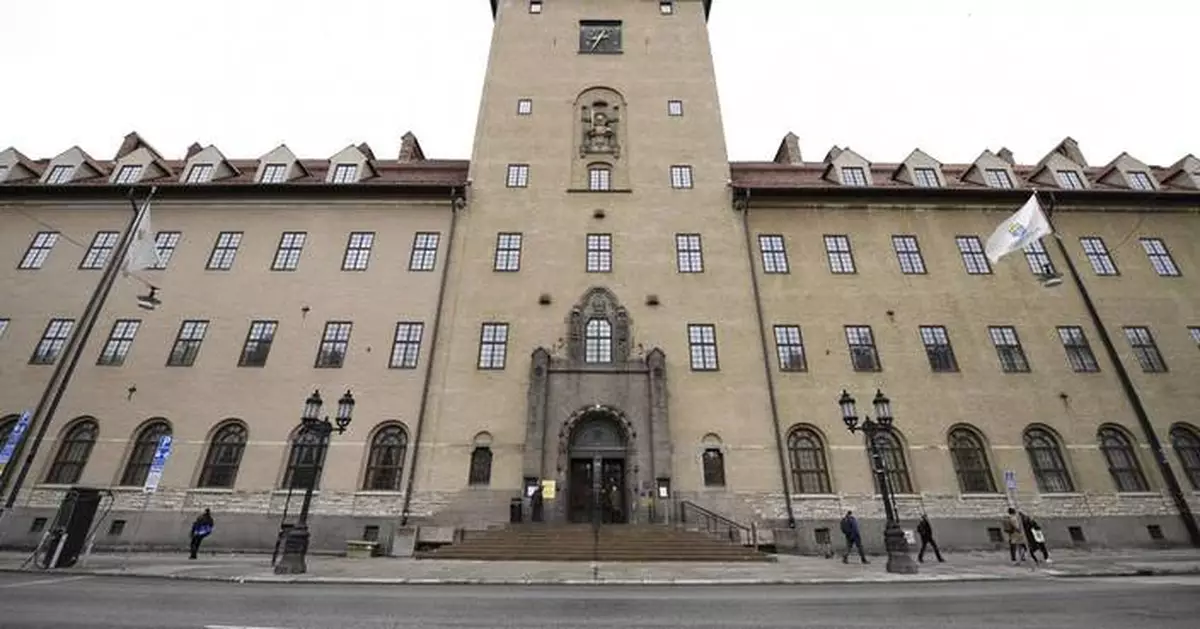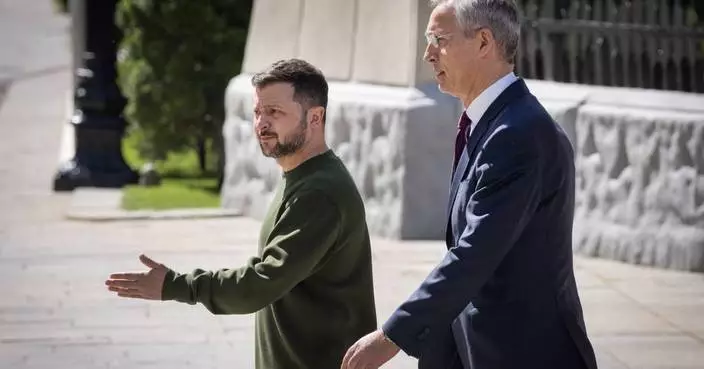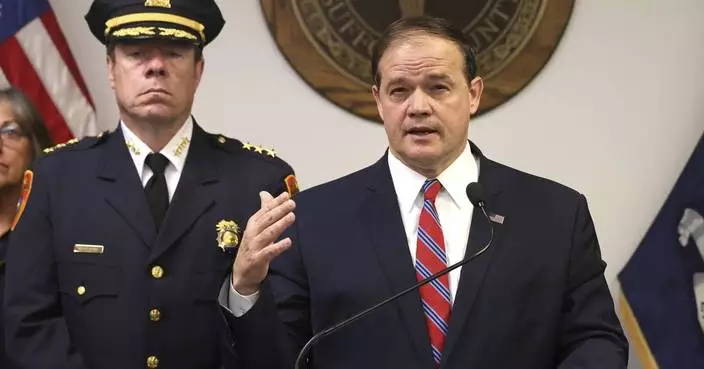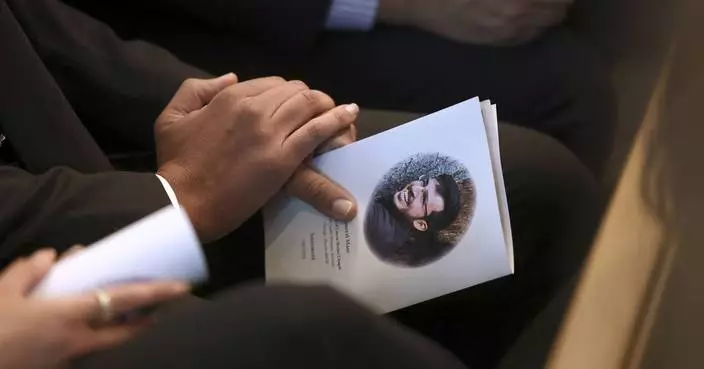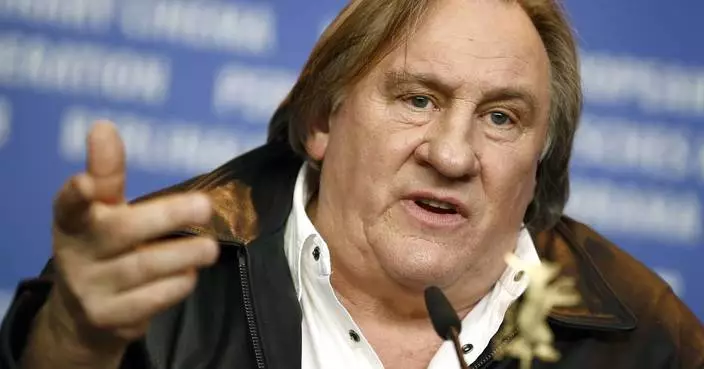STOCKHOLM (AP) — The trial of a former Syrian army general over his alleged role in war crimes committed in 2012 in his home country started at a Stockholm court Monday, a first according to a human rights organization.
Syria has been ravaged by civil war for over 13 years.
Brig. Gen Mohammed Hamo, who is currently residing in Sweden, is charged with aiding and abetting crimes violating international law, described by the prosecution as “a serious crime" when he was charged in February.
The Associated Press got a hold of Hamo's accusation sheet in which the prosecutor claims the 65-year-old — who was a brigadier general in the Syrian army between January 2012 and July 2012 — has participated in the warfare that “systematically included attacks carried out in violation of the principle of distinction, caution and proportionality,” adding that the attacks were “indiscriminate.”
The prosecutor also said Hamo worked in the Syrian army's 11th division and he was vital in making "strategic decisions and (implementing) military operations.”
"This trial is important because it’s the first time that anyone from the Syrian government or the Syrian army is actually put on trial for the attacks that took place,” said Aida Samani of the Stockholm-based Civil Rights Defenders, a politically and religiously independent human rights organization.
The former general risks up to 18 years in jail and even life imprisonment, Samani said. A life sentence in Sweden is generally between 20 to 25 years in prison.
Eight plaintiffs filed the case against Hamo, including a man whose brother was killed in the attacks on the Syrian city of Homs, as well as a British photographer and a French journalist who were both injured in the attack on the city's media center, the Swedish news agency TT said.
Little is known about Hamo. He defected from the Syrian army in July 2012 and joined those fighting to remove President Bashar Assad from power. Syrian opposition activists say he was involved in the fighting in the once rebel-held neighborhood of Baba Amr in Homs city, Syria’s third largest.
He lived in central Sweden until he was arrested over his supposed participation in war crimes on December 7, 2021. A court at the time released him two days later, saying there wasn't enough evidence to keep him incarcerated. He has since been free.
Hamo's defense lawyer, Mari Kilman, said her client maintained his innocence.
The unrest in Syria between Assad’s regime and opposition groups began in March 2011 and later exploded into a civil war that killed nearly half a million people and displaced half the country’s pre-war population of 23 million.
The trial at the Stockholm District Court is planned to last 18 days with the last court session on May 21. No date for a verdict was announced.
— Jan M. Olsen in Copenhagen, Denmark, contributed to this report.

General view of the Stockholm District Court ahead of the main hearing against the former Syrian brigadier general Mohammed Hamo, who stands accused of aiding and abetting war crimes in Syria in 2012, and whose trial starts today, Monday April 15, 2024 (Oscar Olsson/TT News Agency via AP)
CHARLOTTE, N.C. (AP) — United Methodist delegates are heading into the homestretch of their first legislative gathering in five years — one that appears on track to make historic changes in lifting their church's longstanding bans on same-sex marriage and the ordination of LGBTQ clergy.
After a day off on Sunday, delegates to the General Conference of the United Methodist Church resumed their work Monday and will be meeting all this week before wrapping up their 11-day session on Friday
They've already begun making historic changes: On Thursday, delegates overwhelmingly endorsed a policy shift that would restructure the worldwide denomination into regional conferences and give the U.S. region, for the first time, the same right as international bodies to modify church rules to fit local situations.
That measure — subject to local ratification votes — is seen as a way the U.S. churches could have LGBTQ ordination and same-sex marriage while the more conservative overseas areas, particularly the large and fast-growing churches of Africa, could maintain those bans.
But whether that measure maintains church unity remains to be seen. The General Conference comes as the American portion of the United Methodist Church, long the nation's third-largest denomination, has shrunk considerably. One-quarter of its U.S. churches left between 2019 and 2023 amid conservative dismay over the church's failure to enforce its LGBTQ bans amid widespread defiance.
A proposal to overturn those bans is headed to the delegates this week, and progressives are optimistic that they have the votes to realize their long-held dream.
Bishop Karen Oliveto of the Mountain Sky Episcopal Area, the first openly lesbian bishop ordained in the church, said the tenor of the current conference is positive.
“The delegates are listening to each other, learning from each other, really providing a foundation for the work this week,” she said. “There have been hard conversations, but again this tone that we’re in this together. And we have a witness to make to the world that’s unified even in the midst of cultural differences.”
The denomination has debated homosexuality for more than half a century. Its Book of Discipline bans “self-avowed practicing homosexuals” from the clergy and forbids clergy from presiding at same-sex marriages. It also forbids church funding of any advocacy for the “acceptance of homosexuality.”
But legislative committees last week overwhelmingly approved several proposals liberalizing the church’s stance on sexuality. They included one committee that voted 43-9 to overturn the ban on LGBTQ clergy.
The delegates will also vote on a new set of Social Principles — a wholesale revision of an existing set of non-binding statements — which also received overwhelming committee approval last week. The new version omits the previous version's declaration that homosexuality is “incompatible with Christian teaching." And it defines marriage as a sacred covenant between “two people of faith,” without specifying gender.
Such changes could portend a further fragmentation of the international church. Delegates last week approved the departure of a small but notable part of the body — about 30 churches in Russia and other former Soviet countries, where conservative views on LGBTQ issues are strong.
Some are proposing that African and other churches be given the same chance that U.S. churches recently had to disaffiliate under favorable terms, including U.S. churches that missed the earlier deadline to do so, but a committee vote recommended against such measures.
Opponents say they already have mechanisms to depart, as some have recently done, but proponents say existing rules are burdensome.
Jerry Kulah of the advocacy group Africa Initiative said that while it will be up to individual conferences in Africa to decide whether to stay or leave the denomination, he believes it's time to leave.
“We cannot remain in this marriage,” he said. “We can’t be one church preaching different gospels.”
A large majority of African bishops, while affirming their opposition to LGBTQ ordination or marriage, have said in a joint statement they are committed to remaining in the United Methodist Church.
The denomination had until recently been the third largest in the United States, present in almost every county. But its 5.4 million U.S. membership in 2022 is expected to drop once the 2023 departures are factored in.
The denomination also counts 4.6 million members in other countries, mainly in Africa, though earlier estimates have been higher.
Conservative advocacy groups say U.S. churches that didn't meet the 2023 deadline should have the option of disaffiliating, too — along with the more than 7,000 that have already done so.
The denomination also will be debating policy stances regarding fossil fuels and other issues as well as voting on major budget cuts to denominational programs, reflective of losing thousands of congregations.
The Rev. Tracy Cox, lead pastor of First United Methodist Church in Pittsburgh, said she’s cautiously hopeful for changes to the rules on ordination and marriage. The congregation, which has long been LGBTQ-affirming, held a commissioning service on April 14 for those attending the General Conference.
“If you are called by God to be an ordained elder or deacon, no church, no institution should step in that way,” Cox said. “And as far as marriage goes, when somebody falls in love with someone, we need to be able to help them to raise a family or to be a family in the community where they’re going to serve.”
Added Tracy Merrick, a member of the congregation and a delegate: “It will say to the world about us that we really stand behind our statement that we are a church of open hearts, open minds, and open doors.”
Associated Press religion coverage receives support through the AP’s collaboration with The Conversation US, with funding from Lilly Endowment Inc. The AP is solely responsible for this content.
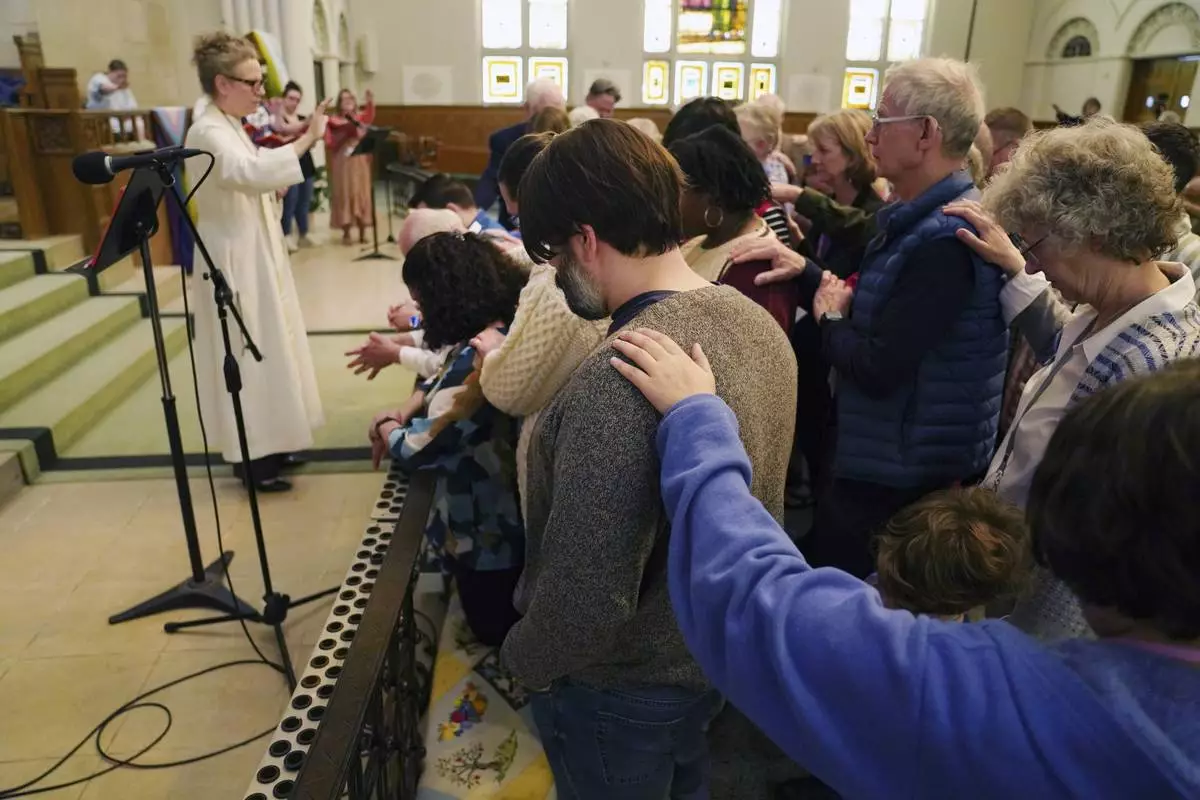
The Rev. Tracy Cox of First United Methodist Church, left, and members of her congregation pray for Tracy Merrick, a delegate representing Western Pennsylvania at the United Methodist General Conference, as well as The Rev. Anais Hussian and Joshua Popson, Sunday, April 14, 2024, in Pittsburgh. Hussian is a reserve delegate at the General Conference and Popson is advocating for LGBTQ inclusion with the Love Your Neighbor Coalition. The 11-day conference is the denomination's first legislative gathering since a special session in 2019. (AP Photo/Jessie Wardarski)
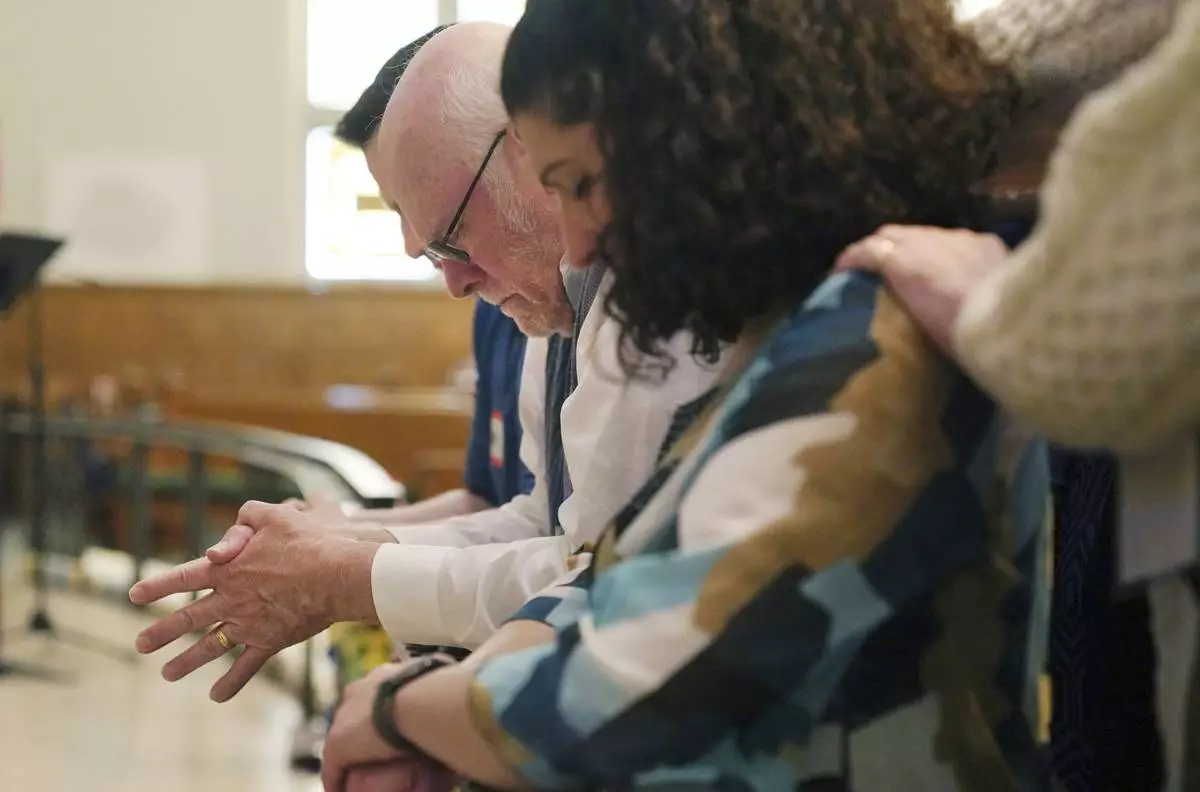
First United Methodist Church congregants pray for members attending the United Methodist General Conference, including Tracy Merrick, left, a delegate representing Western Pennsylvania, The Rev. Anais Hussian, a reserve delegate, and Joshua Popson, who is advocating for LGBTQ inclusion with the Love Your Neighbor Coalition, Sunday, April 14, 2024, in Pittsburgh. The 11-day conference is the denomination's first legislative gathering since a special session in 2019. (AP Photo/Jessie Wardarski)



